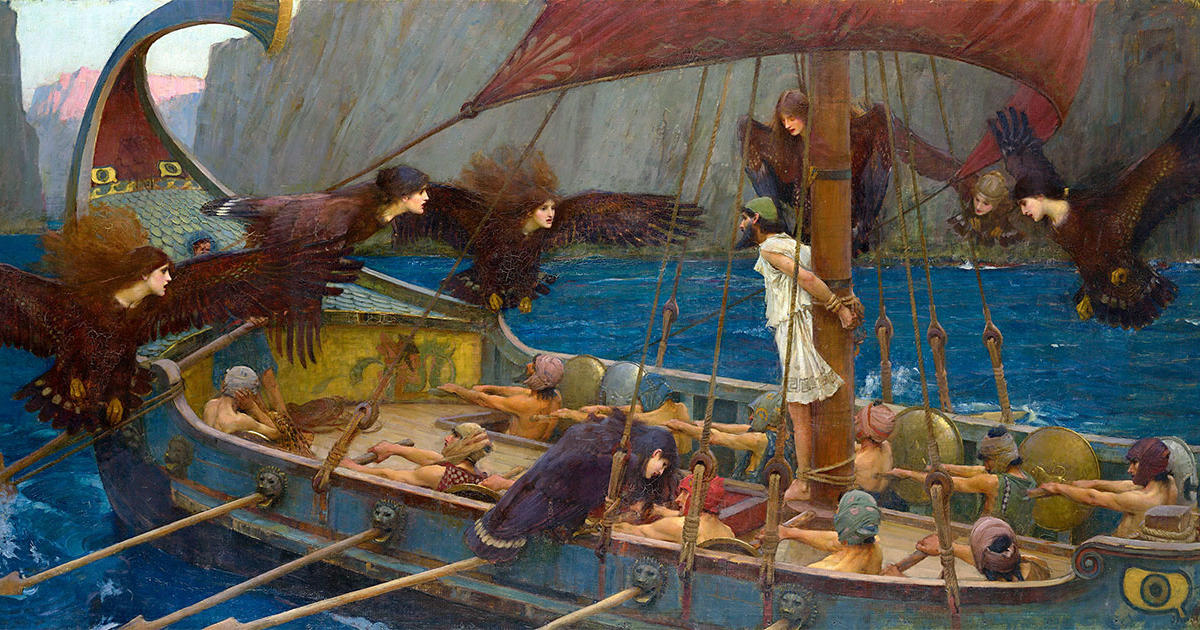Sirens: Death music
When Jason, about whom we shall learn much more at a later time, mobilized a band of Argonauts to assist him in capturing the Golden Fleece, he chose the musician Orpheus to join the expedition. This inclusion puzzled many, especially since Jason had earlier declined the warrior-maiden Atalanta's offer to accompany them. Orpheus was the consummate musician who devoted his entire life to composition and, of course, to his beloved Eurydice. He never so much as threw a punch, fearing the damage such an assault would inflict on his lyre-strumming hand. Why deny admission to the woman who slew the Calydonian boar while accepting the services of a frail fellow capable only of music-making? Jason, in his defense, would have explained that though she was a formidable fighter, Atalanta would have been the only woman on a ship teeming with virile men: a situation more fraught with peril than a continent of Cyclopes. Moreover, the wise centaur Chiron had earlier advised Jason to bring Orpheus along, even though Jason secretly thought the musician wouldn't prove too helpful. In fact, Orpheus likely saved the entire expedition. At one point, just after sunset, a time when the gloaming light can cast an unearthly luster onto even the barest shores, the Argo veered close to the lush island of Anthemoessa, from which six strange "birds" took flight. As these creatures approached, the stunned Argonauts saw that those birds sported the heads of beautiful women. The disbelief turned into delight as the birds began to sing the most enchanting melody they had ever heard. The men wept openly and begged Tiphys, the helmsman, to steer the ship toward the island. Yet, before Tiphys could respond, the music of these creatures, the Sirens, was suddenly drowned out by an even lovelier sound, that of Orpheus' lyre. Jason pushed all the men to one side of the ship so as to be close to their on-board musician. Orpheus' lovely tones protected them from the Siren song as the Argo drifted past. Only one Argonaut, Butes, continued to hear the Sirens. He desperately leapt into the sea and would have drowned while attempting to reach the island had Aphrodite, who loved him, not intervened to save his life. Orpheus continued to perform until the receding island appeared as no more than a dark patch about which six gnat-like creatures swarmed in a fury. The Sirens watched in misery as the Argo's mast blinked out below the horizon. Despite their best efforts, they were denied a ship's worth of victims.
As night descended, the six Sirens gathered at the island's center and hungrily picked scraps of flesh out of the bone piles of previous ill-fated sailors: a mean meal, indeed, compared to what had escaped.
Born from the union of the Muse Calliope and the river god Achelous, the Sirens numbered six -a value that is widely disputed. They were Leucosia ('the white), Ligei ('shrill') Himeropa ('gentle-voice'), Thelxiepeia ('enchanting speech'), Aglaopheme ('lovely voice'), and Peisinoe ('persuasive'). The Sirens bore heads of women attached to the bodies of carrion-devouring birds. Having been confined to the area on and around their home island, the Sirens fed only on fish and on the sailors unfortunate enough to have ventured too close to Anthemoessa. It was said that the Siren' song was so alluring that anyone who heard it would be drawn to the island. Either the ship would be wrecked against the shore rocks, killing the mariners, or the sailors would arrive safely, only to remain on the island listening to their music until they starved to death. In either case, the Sirens dined on the corpses. They naturally preferred shipwrecks for the carrion was plumper and became available far more readily. Not only did they need the sailors for their nourishment, but it was also said that the Sirens would perish were any ship to pass without succumbing to their spell. (Apparently the safe passage of the Argo didn't count as one crew member, Butes, did succumb, almost.)
Many years after the Argo escaped, the ship conveying Odysseus back to Ithaca came upon the island Anthemoessa. Fortunately, Circe, a sorceress who had hosted Odysseus and his men -after having transformed them into swine for awhile- warned Odysseus about the Sirens and their deadly allure. So, when they strayed near the island and saw the Sirens arise out of it, Odysseus commanded his men to tie him firmly to the mast. All the men, save Odysseus, stuffed their ears with beeswax so as not to hear the Sirens or, as it turned out, Odysseus himself. As the Sirens surrounded the moving ship and sang, Odysseus screamed to the men to steer the ship toward the island. He shrieked, stomped and struggled in vain against the bindings that held him fast. The men rowed determinedly away from the island while Odysseus continued to shout commands his men could not hear. Only when the island was out of sight did the steers men remove the wax. Three of them untied Odysseus. As he was out of range, Odysseus no longer wished to travel to the island he could no longer see. Had he been able to observe Anthemoessa at that moment he would have noticed the corpses of six Sirens floating next to its shore. The safe passage of Odysseus' ship drove them all the Sirens to despair and they drowned themselves. Odysseus, alone, was the only mortal to hear the entire Siren song as the ship passed by. Of all the memories he accumulated during his perilous odyssey, those of the Sirens turned out to be the most haunting and beautiful.
THE SOUTHWORTH PLANETARIUM
70 Falmouth Street Portland, Maine 04103
43.6667° N 70.2667° W
Altitude: 10 feet below sea level
Founded January 1970
Julian Date: 2459102.16
2020-2021: VII
THE DAILY ASTRONOMER
Wednesday, September 9, 2020
Remote Planetarium 85: More Questions II
_________________________________
Happy 22nd birthday, Infernally adorable
young lady. Another year older...sigh.......
_________________________________
Today we continue to address some outstanding astronomy questions that we didn't mean to neglect, but did, anyway. Our sincerest apologies to those who have waited far too long for these responses.
Will the Universe exist forever? If so, what will happen to it?
-N.J.
Quite a grand question to begin the day. The notion of an eternal Universe came into vogue recently with the discovery of dark energy, the force believed to be responsible for the acceleration of the cosmic expansion. Prior to the advent of the Dark Energy Theory, cosmologists wondered if the cosmos would (a) continue to expand forever, (b) continue to expand before halting and then imploding in a "Big Crunch" event or (c) continue to expand before stopping entirely and neither expanding nor contracting. As the cosmos is actually accelerating in its expansion, it would seem likely that it will persist forever: time will never end, a notion far beyond our human intuition. If the Universe does last forever, what will transpire in "Deep Time?" According to current models, one would expect the following
200 billion years from now: "Galaxy isolation." More than 190 billion years after the Sun perishes, the galaxies will have all moved out of range of one another. Long before that time, the Milky Way and Andromeda Galaxies will have merged, along with an assortment of dwarf galaxies. Only close galaxies will experience these collisions with the Milky Way-Andromeda complex. The others will continue to move as a consequence of the expansion. Eventually, it will appear as though this mega-galaxy is alone in space. Beings within other galaxies would also feel curiously isolated as all the other galaxies recede out of view. This timeline naturally assumes that the acceleration will continue at the rate measured today....not necessarily a safe assumption.
Our Universe might indeed persist forever. If it does, the cosmos will eventually succumb to 'heat death,' a state of maximum entropy. The Universe would then remain in this dormant condition for all eternity.
100 trillion years from now: We have veered headlong into incomprehensibly long stretches of time. According to current stellar models, the last of the stars will have perished. The cosmos will be dark and cold again as the last traces of star fire are snuffed out. As was true with the previous paragraph, this time frame assumes that no implosion occurs. We should mention that the period of 100 trillion years is 7,429 times longer than the current age of the Universe.
Add 26 zeroes to that number and one arrives at the true beginning of heat death, when the remaining atomic matter will have decayed back into energy.
Add another 60 zeroes and even the last of the black holes will have evaporated through the emission of Hawking radiation. The cosmos shall become nothing more than vast chasm permeated by the faintest radiation.
The true problem with the notion of eternity is that the Universe would pass through 1 with 60 zeroes years over and over and over again ad infinitum. Trillions upon trillions of years of nothingness expanding ever faster..unless, of course, the cosmos experienced a "Big Rip" in which everything is cast asunder. That event would destroy the Universe and so it wouldn't be eternal. The fate of the cosmos remains unknown. We do, however, know that we exist in the springtime of our Universe. Stars born by the thousands every second, exoplanets forming from the peripheral clouds and here on Earth we're striving toward ever increasing levels of complexity in thought, science and technology. The epoch of the quiet cosmos remains safely out in the unfathomable reaches of deep time.
Can the Sun ever be seen at the North Pole and South Pole at the same time?
-S.D.
Yes, it can and, actually, soon will be. We know that the Sun will set at the North Pole later this month, on September 25th to be precise. It is widely believed to set on the autumnal equinox, which this year occurs on September 22nd. It would, indeed, set on that date if Earth harbored no atmosphere. Yet, as you very well know from the sounds of your breathing, our planet is surrounded by an envelope of gases. These gases cause an effect called "refraction," which projects the images of objects just below the horizon up above it. The amount of refraction is greatest along the horizon, about 1/2 a degree, equal to the Sun's apparent angular diameter. Even though the Sun will set on September 22nd at the North Pole, the atmosphere will project the Sun's image above the horizon until September 25th. Meanwhile, at the South Pole, the Sun will peek above the horizon around September 19th, three days before the September equinox. (We can't refer to it as autumnal as September 22nd marks the first day of spring in the Southern Hemisphere.) The atmospheric refraction pushes the Sun's image up at the South Pole, as well.
Sunrise at the South Pole
So, in fact, the Sun does appear simultaneously at the North and South Pole for about five days in September and again for about five days in late March. If Earth didn't have an atmosphere, the Sun would set at the North Pole at the same time it set at the South Pole. Of course, if the planet had no atmosphere, that would be the least of our concerns.
To subscribe or unsubscribe from the Daily Astronomer:




